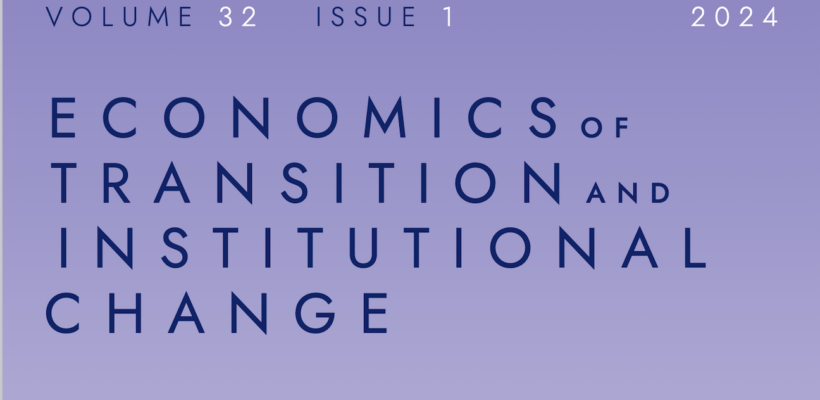
MSM and BAB Program Chairs Publish in Economics of Transition and Institutional Change Journal
3 min readYEREVAN, Armenia — The American University of Armenia (AUA) Master of Science in Management (MSM) Program Chair Dr. Vardan Baghdasaryan and AUA Bachelor of Arts in Business (BAB) Program Chair Dr. Gayane Barseghyan published their joint study on “Child care fee abolition and female labor supply: Quasi-experimental evidence from a developing country’’ in Economics of Transition and Institutional Change. The journal publishes high-quality research investigating, among other topics, the impact of institutions on economic performance and the effects of policy reforms at macro- and microeconomic levels.
The article investigates the impact of child care fee abolition on the maternal labor supply, providing evidence from a developing country, Armenia, which has a low female labor force participation. The reform was implemented back in 2011, but exclusively in the capital city of Yerevan.
“Using a quasi-experimental design, we investigate the effect of the policy reform on the female labor supply and provide evidence from a developing country,” notes Dr. Barseghyan, “The effects of reduction or abolition of child care costs on labor supply have been extensively studied for developed countries, not only because of the vast and financially costly reforms that were implemented to enhance service affordability and increase female labor force participation, but also because of the availability of large and high-quality data from labor force surveys. Aiming to study such reform effects in a developing country, we considered Armenia and used data from the “Households’ Integrated Living Conditions” survey, as separate labor force surveys have only been conducted since 2014. Identifying mothers in our dataset posed a challenge, since there was no such specific question aligned with our research requirements, and moreover households in Armenia often comprise more than one family. We identified mothers based on the information in the data on relationships within the household. Using the difference-in-differences methodology, we found a statistically significant increase in maternal labor supply, but only sustained for the short-term.”
“This was quite a long journey, from inception to publication,” adds Dr. Baghdasaryan, “I was still a Ph.D. student when I read the news about unexpected policy changes introduced by the Yerevan municipality, but not in the other cities. The setting for a natural experiment was right there, but it was necessary to wait several years until sufficient data were available. In 2018, together with Dr. Barseghyan, we decided to investigate the gender pay gap and female labor supply. That’s when the idea was revived. We applied to the Armenian National Science and Education Fund (ANSEF) for a small research grant and started our work. Despite the disruptions caused by the Covid-19 pandemic, here we are, at the destination of this long yet interesting journey.”
Dr. Baghdasaryan believes that the study has important implications for the future: “The central point is that the easiest way of doing things is not always the best. Unconditional free access to child care facilities without taking into account the status of the parents in the labor market creates capacity constraints at kindergartens and may also result in limited positive outcomes in the labor market. Secondly, this teaches us that any policy requires rigorous evaluation, which requires data accessible for research,” states Dr. Baghdasaryan.”
“The paper was presented at various conferences, and I would point out the one funded by AUA (through the AUA faculty professional development grant that funds conference participation). It was the 11th Workshop on Labor Economics in Trier, Germany, that I participated in, and got useful feedback. This demonstrates the importance of funding to support faculty research activities with the ultimate goal of getting them published. AUA’s role in fostering such research endeavors is important and much appreciated,” concludes Dr. Barseghyan.
Founded in 1991, the American University of Armenia (AUA) is a private, independent university located in Yerevan, Armenia, affiliated with the University of California, and accredited by the WASC Senior College and University Commission in the United States. AUA provides local and international students with Western-style education through top-quality undergraduate, graduate, and certificate programs, promotes research and innovation, encourages civic engagement and community service, and fosters democratic values.
